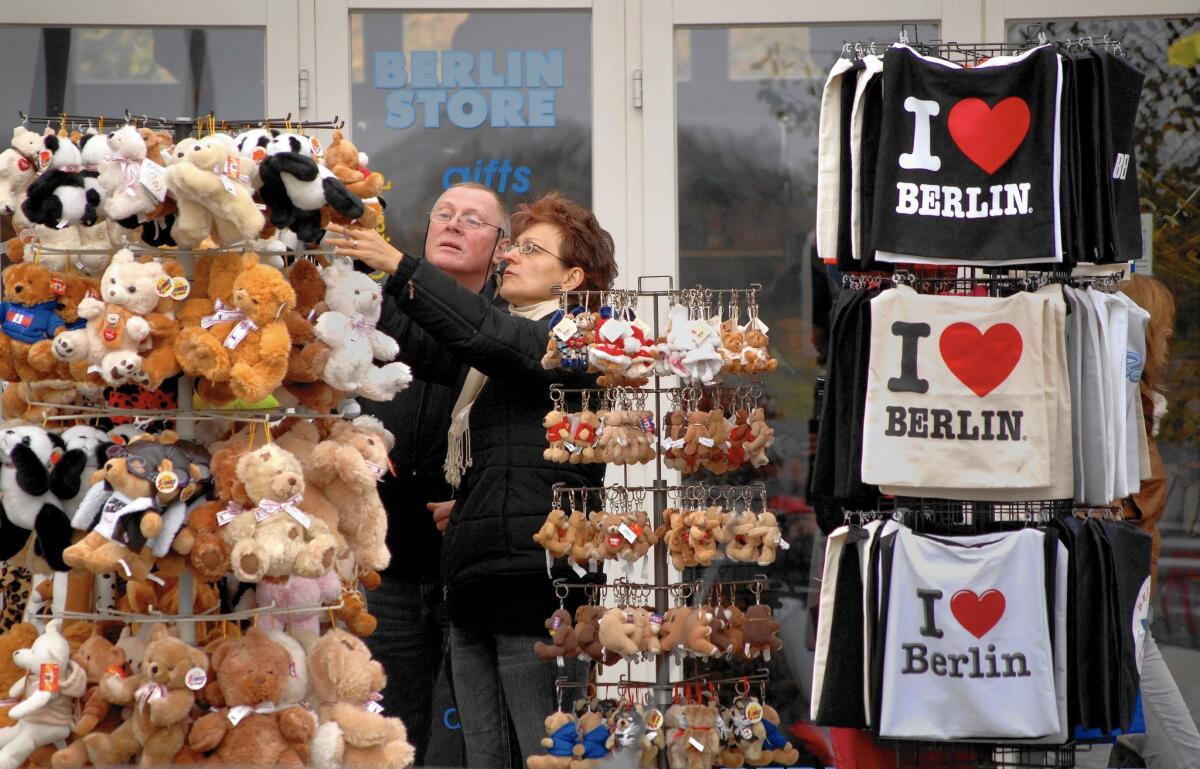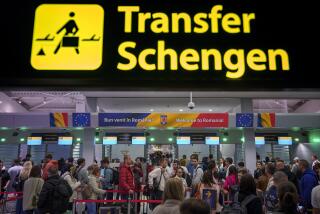EU reopens borders to travelers from 14 countries, the U.S. not included

- Share via
BRUSSELS — The European Union announced Tuesday that it will reopen its borders to travelers from 14 countries, but most Americans have been refused entry for at least an additional two weeks because of soaring coronavirus infections in the U.S.
Travelers from other big countries such as Russia, Brazil and India, which are all wrestling with sharply rising coronavirus caseloads, will also miss out.
As Europe’s economies reel from the effect of the coronavirus, southern EU countries such as Greece, Italy and Spain are desperate to entice visitors and breathe life into their damaged tourism industries.
More than 15 million Americans are estimated to travel to Europe each year, while some 10 million Europeans head across the Atlantic. But bans on travel in both directions — President Trump suspended U.S. entry of European visitors in March — remain in force.
Citizens from the following countries will be allowed into the EU’s 27 member states and four other nations in Europe’s visa-free Schengen travel zone: Algeria, Australia, Canada, Georgia, Japan, Montenegro, Morocco, New Zealand, Rwanda, Serbia, South Korea, Thailand, Tunisia and Uruguay.
The EU said China is “subject to confirmation of reciprocity,” meaning that Beijing must lift all restrictions on European citizens entering China before it will allow Chinese citizens back in.
Travel restrictions announced by U.S. president will do little to stem coronavirus spread, European leaders say
Countries considered for the safe list are also expected to lift any bans they might have in place on European travelers.
The list is to be updated every 14 days, with new countries being added and some dropping off depending on whether they are keeping the disease under control.
“We have to remain vigilant and keep our most vulnerable safe,” tweeted European Council President Charles Michel.
Still, many people both inside and outside Europe remain wary of travel in the coronavirus era, given the unpredictability of the pandemic and the possibility of second waves of infection that could affect flights and hotel bookings. Tens of thousands of travelers had a frantic, chaotic scramble in March to get home as the coronavirus swept across the world and borders slammed shut.
The number of confirmed coronavirus cases in the U.S. has surged over the last week. In contrast, aside from a notable recent outbreak tied to a slaughterhouse in western Germany, the virus’ spread has generally slowed across much of continental Europe.
The coronavirus means Venice, Italy, still cannot count on tourists
European Union countries hastily slapped restrictions on who could cross their borders in February as the virus spread in Italy. Then, in mid-March, European governments limited all nonessential travel to the 27 EU member states, plus Liechtenstein, Iceland, Norway and Switzerland.
Non-EU citizens who are already living within the EU’s borders are not included in the ban.
The EU list does not apply to travel into Britain, which officially left the bloc in January. Britain requires all incoming travelers — bar a few exceptions, such as truck drivers — to go into a self-imposed 14-day quarantine, although the measure is under review and is likely to ease in the coming weeks. The requirement also applies to returning British citizens as well as nationals of other countries.
The news that Americans were being left off the EU list was a blow to struggling shopkeepers hoping for a summertime boom.
“Americans were 50% of my clientele,” said Paola Pellizzari, who owns a mask and jewelry shop on the Saint-Louis island in the heart of Paris and heads its business association. “We can’t substitute that clientele with another.”
The Louvre museum is scheduled to reopen July 6. Americans used to be the largest single group of foreign visitors to the home of the “Mona Lisa.”
“When I returned after lockdown, five businesses had closed,” Pellizzari said. “As days go by, and I listen to the business owners, it gets worse.”
Sharmaigne Shives, an American who lives in Paris, said she hopes her compatriots can turn things around soon.
“Paris isn’t Paris when there aren’t people who really appreciate it and marvel at everything,” she said. “I miss that. Seriously, I feel the emotion welling up. It’s so sad here.”
More to Read
Sign up for Essential California
The most important California stories and recommendations in your inbox every morning.
You may occasionally receive promotional content from the Los Angeles Times.











